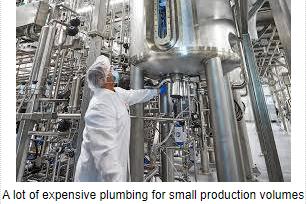 Despite the 2022 approval of cell-cultured meat by Singapore in 2022 and the subsequent action in the U.S., there are profound questions as to the commercial viability of cell-cultured meat. In Singapore, Temasek, a sovereign wealth fund, is providing financial support to startups to allow companies to conduct R&D in shared laboratory and test kitchen facilities.
Despite the 2022 approval of cell-cultured meat by Singapore in 2022 and the subsequent action in the U.S., there are profound questions as to the commercial viability of cell-cultured meat. In Singapore, Temasek, a sovereign wealth fund, is providing financial support to startups to allow companies to conduct R&D in shared laboratory and test kitchen facilities.
 Singapore has a vested interest in developing intensive production of protein given that it imports over 95 percent of food consumed in the city-state.
Singapore has a vested interest in developing intensive production of protein given that it imports over 95 percent of food consumed in the city-state.
Apart from uncertainties over public acceptance and organoleptic properties of meat substitutes, the questions of cost and production volume represent major obstacles to commercialization. A whisper number for production approaching $20 per lb. excluding packaging and distribution is clearly non-competitive with animal-derived meat and poultry.
Good Meat currently produces 2.3 metric tons of cell-cultured chicken substitute annually. This represents 12 minutes of a U.S. plant operating at a line speed of 8,000 birds per hour. Clearly companies face challenges in scaling up from pilot plants to commercial production. High cost and low volume are the reasons why cell-cultured meat is initially offered by the innovators in gourmet restaurants